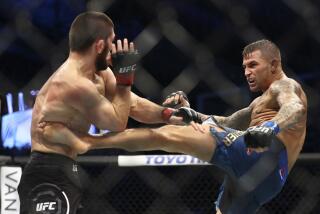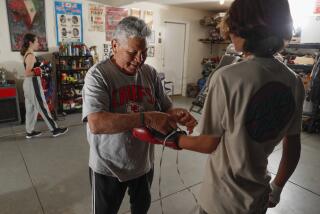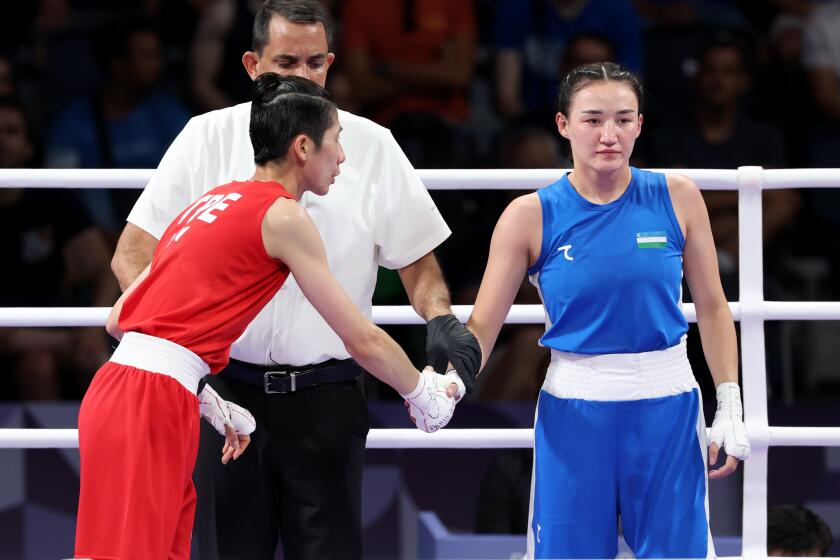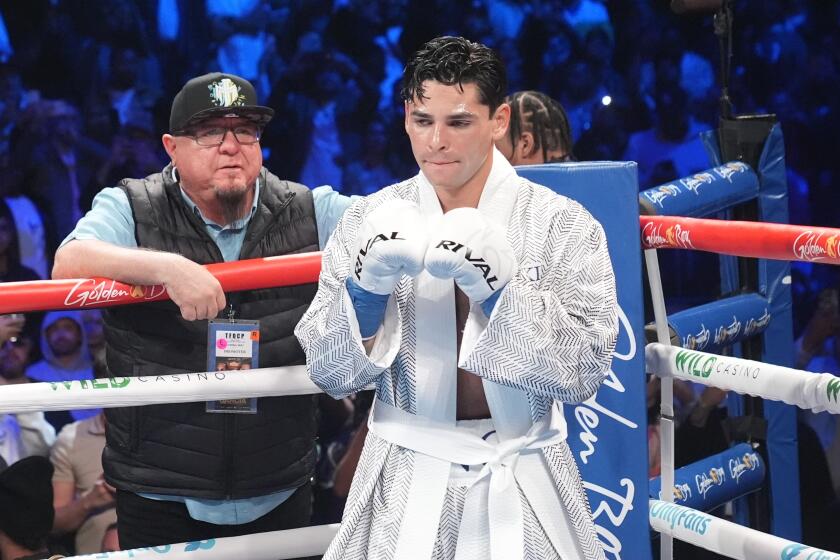Weight of Crown Is Heavy : Unhappy Douglas Receives Little Solace From Oddsmakers
LAS VEGAS — In a way, not much has changed for Buster Douglas, undisputed heavyweight champion of the world.
When he went to Tokyo in February to challenge Mike Tyson, he was widely regarded as a faint-hearted, blubbery stiff. One of the few casinos to post odds on the fight made him a 42-1 underdog. The fight looked so bad, promoter Don King had to ship it to Japan because no one in the United States wanted it.
To condense what happened next, Douglas showed up in marvelous condition and knocked out an out-of-shape, overconfident Tyson in the 10th round.
Now, eight months later, Douglas will defend his championship Thursday for the first time, against Evander Holyfield. And once again, Douglas will be the underdog.
It will be only the 12th time since Jack Johnson upset Jim Jeffries in 1910 that a heavyweight champion has gone into a title fight as an underdog. Holyfield was an 8-5 favorite Sunday.
The odds don’t bother him, Douglas says, but you have to believe it stings, at least a little.
“I don’t care about odds,” he said the other day. “You still have to go in there and fight, whether you’re the favorite or the underdog. I don’t have anything to prove to anybody.”
Since he knocked out Tyson Feb. 11, the 30-year-old Douglas hasn’t seemed like a happy champion. At a Los Angeles news conference a couple of months ago, he allowed Holyfield to get under his skin with some remarks.
Douglas had begun to answer a question about whether he felt he had to beat Holyfield to prove his knockout of Tyson wasn’t a fluke when Holyfield interrupted: “I don’t think you people should be putting all this pressure on Buster.”
Douglas, in a flash of anger, turned on Holyfield, pointed at him, and said, referring to their fight: “I will make you quit.”
Indeed, Team Douglas seems only a shadow of the joyous band from Columbus, Ohio, who laughed, cried and drank in celebration in a Tokyo hotel room after their man beat Tyson and shocked the sports world.
That happy night in Tokyo seems years distant. John Johnson, Douglas’ manager, has seen his role pared down by Douglas. Johnson’s son, John Jr., is out of the picture entirely. Rumors began and persist still that Butch Lewis, manager of former champion Michael Spinks, will eventually take over Douglas’ career.
Two Douglas friends from boyhood, Rodney Rogers and Larry Nallie, came aboard to take over the running of Douglas’ affairs. And always, the shadow of Buster Douglas’ father, Bill, hangs over his son.
Bill Douglas, a top middleweight of the 1960s and once his son’s manager, was fired by his son three years ago, when his career seemed headed in one direction--downhill. In fact, Douglas fired his father three times. Bill Douglas’ last night in his son’s corner was the 1987 fight with Tony Tucker when Buster, ahead on the scorecards, inexplicably quit in the 10th round.
To this day, Douglas will attribute that performance only to “personal problems.”
It’s a love-hate relationship, and a major piece in the puzzle when trying to understand how Douglas, given his spotty record (he was also beaten by journeymen David Bey, Mike White and Jesse Ferguson), could have possibly summoned an effort sufficient to beat an unbeaten heavyweight champion in the prime of his career.
One source has said Douglas urged a settlement of his lawsuit against promoter Don King after learning that his father had been recruited by King and might testify against his son.
The death of Douglas’ mother, Lula, weeks before the Tokyo fight also remains a factor.
A week after the fight, in Columbus, Douglas could scarcely get the words out when talking of her death: “It was a blow, but I decided that her loss would strengthen me, not weaken me.”
Douglas and his wife, Bertha, had separated before the Tyson fight. They reconciled afterward, and are expecting a baby in January. Douglas is no doubt also strengthened now by the memory of numerous relatives who he says used to ask him: “When are you going to give up on boxing and get a job?”
But one relative who never gave up on Douglas is his uncle and trainer, J.D. McCauley. He is given much of the credit for preparing Douglas for the fight of his life in Japan.
“Buster won in Tokyo for two main reasons,” he said. “One, he got himself in great physical condition, particularly his legs. He’d never done roadwork like he did before that fight. We clock his roadwork, so we knew he was in the best shape of his life. We knew that if it was a long fight, he was physically ready.
“When Buster lost to White and Ferguson, people said he had no heart. Well, heart and conditioning are directly related.
“Second, Buster always did have, I think, the best left jab in boxing, but he’d never used it quite right. Against Tyson, he did.”
Happy or not, Douglas is about to become a very wealthy boxer. He took home about $500,000, before taxes, for beating Tyson. But win or lose on Thursday, he will get more than $24 million (Holyfield will receive more than $8 million).
Under the settlement with King, the promoter will get $4 million of Douglas’ share. Some close to Douglas say the settlement is one reason why Douglas hasn’t settled happily into his championship. By suing King, he sought to free himself of promotional ties to the promoter, who, he claimed, tried behind-the-scenes maneuvers to overturn his victory in Tokyo.
Some saw the settlement as a partial victory for King. And should Douglas defeat Holyfield, King said Friday he has letters from three governing bodies certifying Tyson as the mandatory No. 1 challenger, no matter who wins Thursday.
More to Read
Go beyond the scoreboard
Get the latest on L.A.'s teams in the daily Sports Report newsletter.
You may occasionally receive promotional content from the Los Angeles Times.










